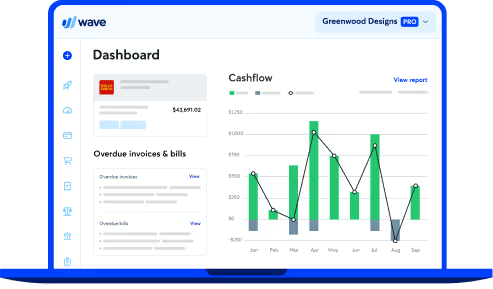
The Ultimate Guide to Small Business Taxes in California
When you think of California, breezy palm trees and beautiful beaches probably come to mind. One thing you probably don't think about? California tax rates.
The bad news: California has pretty high rates for both business and personal taxes compared to other states. That’s why it’s so important to learn how small business taxes in California work—no matter where you are in your business ownership journey—so you can estimate how much tax you’ll owe the state, prepare, and make informed business decisions.
The good news: We’re covering everything you need to know about small business taxes in California. All you need to do to stay informed is keep reading!
How do small business taxes in California work?
Depending on their business structures and gross income (your total earnings before taxes or deductions), there are three types of taxes businesses in California might need to pay:
- Corporate tax
- Franchise tax and/or
- Alternative minimum tax (AMT)
If the income from your business “passes through” to you (more on that down below!), you’re also responsible for paying personal tax on that income.
Double taxation for small businesses in California
In most other states, pass-through entities like S corporations (S corps) or limited liability companies (LLCs) don’t have to pay business taxes because the income they earn “passes through” to their business owners (hence the name “pass-through entity”) and only gets taxed on each owner’s personal income tax return at their individual tax rate.
However, this is not the case in California, which is kind of a bummer. Income earned by S corps and LLCs gets taxed on the business level and the income that “passes through” to each owner gets taxed on the personal level, too. This means a business owner in California may have their tax burden doubled thanks to double taxation (...try to envision those beautiful palm trees right about now! 😮💨).
Franchise tax
Franchise tax applies to “pass-through entities,” like S corporations, LLCs, and partnerships (including limited partnerships (LP) and limited liability partnerships (LLP)). In certain situations, corporations may also owe franchise tax (but more on that later).
Franchise tax is basically payment for the privilege of doing business in California. The amount you have to pay depends on your business structure and your gross income. Regardless of business type, the minimum amount of franchise tax you’ll have to pay is $800.
From January 1, 2021 to December 31, 2023, LLCs, LPs, and LLPs don’t need to pay the minimum $800 franchise tax for their first year of business.

Small business taxes in California for C corporations
C corporations (C corps) and LLCs who opt to be taxed as C corps owe corporate tax, which is 8.84% in California.
If a corporation isn’t making a profit, they need to pay $800 in franchise tax instead, along with something called the alternative minimum tax (AMT), which is 6.65%. Unfortunately, the AMT makes it trickier for business owners to deduct expenses to lower their corporate income tax rate (we’ll get into tax deductions later).
For example, let’s say your California corporation has a net income of $100,000 (nice and even!). Since the tax rate is 8.84% in California, your corporation will owe $8,840 in corporate income tax.
Additionally, any shareholders (individuals or entities who own shares) of a corporation will have to pay tax on any personal income they make from the business. In California, shares (the income from the corporation distributed to shareholders) are taxed at 13.3%.
California small business taxes for S corporations
S corps pay a franchise tax of 1.5% on their net income (or a minimum of $800), along with personal income tax, which is between 1% to 12.3% depending on each owner’s tax bracket.
For example, if an S corp makes $100,000 in net income, it owes $1,500 in franchise tax. The business’s income also “passes through” to each owner, who pays personal income tax on it. The amount of personal income tax owed depends on each owner’s tax bracket.
If your S corp has shareholders, they will pay tax on their respective shares on their personal tax returns, too.
California small business taxes for LLCs
LLCs in California pay franchise tax at a flat amount based on their gross income. Here’s a breakdown of each bracket of gross income, and the franchise tax due:
Less than $250,000: $800 in franchise tax
$250,000 - $499,999: $900 in franchise tax.
$500,000 - $999,999: $2,500 in franchise tax.
$1,000,000 - $4,999,999: $6,000 in franchise tax.
Over $5,000,000: $11,790 in franchise tax.
Additionally, each business owner needs to pay the 1% - 12.3% personal income tax rate on any income that “passes through” to them.
Small business taxes for partnerships and sole proprietorships in California
The way partnerships and sole proprietorships are taxed within California depends on the business type. Limited liability partnerships (LLPs) and limited partnerships (LPs) pay $800 in franchise taxes, flat. Each business owner also needs to pay the 1% - 12.3% personal income tax rate on any income that “passes through.”
Here’s some good news for all of you sole proprietors and general partnerships out there: you do not pay franchise tax. Since income goes straight to the business owner, you only need to pay personal income tax.
California state income tax
Self-employed workers, independent contractors, and unincorporated businesses still have to pay state income tax (despite not owing state corporate tax or franchise tax). As we mentioned before, the state income tax rate in California is between 1% - 12.3%, which is based on your tax bracket (which is determined by your gross income) and your filing status (which is based on your marital and family status).
Tax deductions for small businesses in California
If you want to lower your amount of taxable income (in other words: pay less in taxes), tax deductions are a great option. A tax deduction is a business expense you can subtract from your taxable income, which can lower the amount of tax you have to pay. Think of it this way: It’s like you “earned” less money, and therefore have to pay less tax.
In California, $4,803 is the standard deduction for state income taxes.
In order to be "deductible," a business expense must be ordinary and necessary. Think things like:
- Advertising and marketing
- Transportation and travel
- Insurance
- Legal and professional fees
- Office-related expenses
- Utilities
In order to claim deductions, make sure you’ve been properly bookkeeping your business expenses, and have the receipts and documentation to prove they’re legit.
The 2% rule for tax deductions
…buuuut there’s a catch to tax deductions. You can only make deductions once your total amount of business expenses is more than 2% of your adjusted gross income (AGI). Here an example:
Let’s say your AGI is $100,000. If 2% of your AGI is $2,000, your business expenses need to be over $2,000 before you can start deducting.
Now let’s say your business expenses were $8,000 in total. Since you can only start deducting after $2,000, this means your first $2,000 doesn’t count, and your total amount of business expenses you can potentially deduct is actually $6,000.
The bottom line on business taxes in California
Okay, despite all the doom and gloom about taxes, California can be a super great place to start a business. For one thing, the weather is nice and sunny (see, no doom and gloom there!), and it has the largest economy in the US.
Plus, now that you’re informed about how small business taxes work in California and how much you can expect to owe based on your business structure, you can use this information to determine how you want to structure your business and make informed decisions that will help your business thrive in California.
If you need extra help understanding California’s small business taxes or figuring out what business structure will help you keep more of your money, Wave’s in-house accounting coaches are on call to provide you with personalized, one-on-one help. Wave’s accounting pros can also help you find out what taxes you owe and determine every single tax deduction you qualify for.
(and create unique links with checkouts)
*While subscribed to Wave’s Pro Plan, get 2.9% + $0 (Visa, Mastercard, Discover) and 3.4% + $0 (Amex) per transaction for the first 10 transactions of each month of your subscription, then 2.9% + $0.60 (Visa, Mastercard, Discover) and 3.4% + $0.60 (Amex) per transaction. Discover processing is only available to US customers. See full terms and conditions for the US and Canada. See Wave’s Terms of Service for more information.
The information and tips shared on this blog are meant to be used as learning and personal development tools as you launch, run and grow your business. While a good place to start, these articles should not take the place of personalized advice from professionals. As our lawyers would say: “All content on Wave’s blog is intended for informational purposes only. It should not be considered legal or financial advice.” Additionally, Wave is the legal copyright holder of all materials on the blog, and others cannot re-use or publish it without our written consent.


























